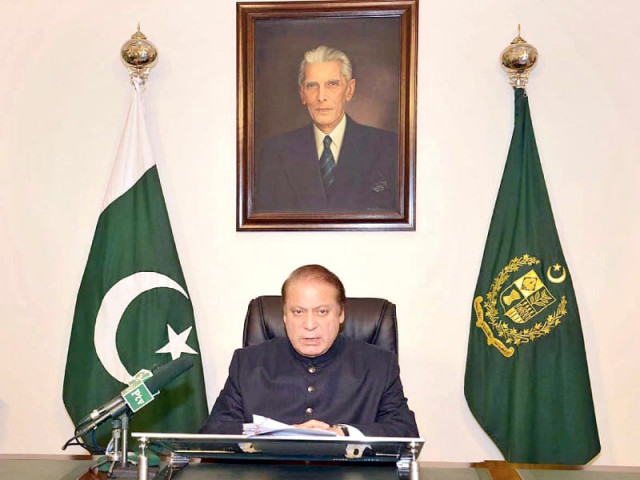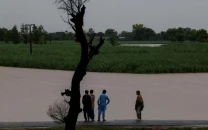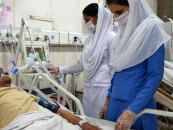Dealing with terrorism: Dialogue is not the only option, says Nawaz
PM offers talks to militants but says his govt will also use ‘full force’ to eliminate militancy.

Prime Minister Nawaz Sharif addressing the nation over television and radio networks in Islamabad. PHOTO: APP
Prime Minister Nawaz Sharif Monday called for dialogue with militants to end a resilient insurgency that has killed and maimed thousands of Pakistanis over the past few years. In the same breath, he however warned that his government would also use force to stamp out militancy from the country.
In his maiden televised address to the nation, the premier spoke about the major challenges his administration inherited from its predecessor, such as a chronic energy crisis, an ailing economy, a volatile security situation and a flawed foreign policy. However, he stopped short of unveiling specific policies to tackle these crises.
“Wisdom demands that we follow a path where we minimise the loss of innocent lives,” the premier said in a partly-written and partly-extempore speech. Nawaz said he was expanding on his original offer after the elections of inviting all political parties to discuss together how best to resolve the security and economic woes.
“This policy of reconciliation is not confined just to political parties. I take a step forward and invite for dialogue all those elements who have unfortunately adopted the path of extremism.”
But the premier said dialogue was not the only option. “I want an end to terrorism whether it is through dialogue and reconciliation, or through full use of force,” he added.
He blamed the government, security services and the judiciary for failing to crackdown on terrorism, but stopped short of naming anyone or of unveiling any new policies to check the violence.
“The time has come when we should admit that our administrative institutions, our agencies and our system of justice have failed to appear competent in dealing with the challenge of terrorism,” he added. “The nation is justified to know why concrete steps were not taken to stop the bloodshed and destruction.”

Energy crisis
The prime minister attributed the debilitating energy crisis to the “insensitivity and corruption” of the previous governments. In particular, he cited the Nandipur and Neelum-Jhelum power projects which were either obstructed or criminally delayed, resulting in a massive increase in their cost.
About the short-term measures his government has taken since taking over, Nawaz said that a whopping Rs480 million circular debt has been retired and the power production has been increased by 1,700 megawatts.
Reiterating his resolve to continue his aggressive campaign against power theft, the premier said a massive theft of electricity and gas, costing Rs150 to 250 billion annually, was a major reason for the worsening energy crisis.
About his long-term measures in the power sector, the prime minister said coal-based power plants with aggregate capacity of 6,600MW would be inaugurated at Gaddani‚ followed by establishment of similar plants at Thar.
Economy
Emphasising the need to ensure the development of this nerve centre, the premier said he wanted to develop Karachi and initiate projects like underground metro to mitigate people’s problems.
China has agreed to partner in Pakistan’s development, he said, adding that under the Kashghar-Gwadar economic corridor‚ a highway would be constructed followed by a railway line, which would change the destiny of the region.
Voicing his dream of an ‘Asian Tiger,’ Nawaz laid out his vision of extending motorways and communication links through Kabul to Central and South Asia. He invited the youth to play their role in rebuilding Pakistan and said his government would soon announce details of a programme prepared for welfare of the youth.
Foreign Policy
Calling for a ‘bold review’ of the country’s foreign policy, the prime minister said a strong economy and internal peace were essential for a strong foreign policy.
He reiterated Pakistan’s support for the Kashmiri people and called the disputed Himalayan region as the ‘jugular vein’ of Pakistan. He added that his government wants to have good neighbourly ties with India. The two countries need to sit together to address common issues like poverty and ignorance.
He also sought to soothe recent fears about escalation of tensions with the neighbouring country, saying that the nation was fully prepared to defend the motherland alongside its valiant armed forces.
Balochistan conundrum
Reminding the people about his party’s decision to let a nationalist party form the government in Balochistan, Premier Nawaz said the state of affairs in the restive province would not be allowed to persist and the federal government would provide all resources and support to the elected provincial administration for restoration of peace in Balochistan.
Published in The Express Tribune, August 20th, 2013.



















COMMENTS
Comments are moderated and generally will be posted if they are on-topic and not abusive.
For more information, please see our Comments FAQ